Voodoo Medics — Part 2: Fighting in Afghanistan like a ‘movie scene’
When Private Chad Elliott was ambushed and shot by the Taliban, he says it felt like a “sledgehammer”. Medic Jody Tieche heroically fought to save his life (graphic warning) in what he described the war zone as a scene straight out of Hollywood. WATCH THE DOCUMENTARY SERIES NOW.
FOR the rest of the Australian commando platoon, the message yelled over their radios almost could not have been worse: “We have a prior one casualty.”
But for Corporal Jody Tieche, when that urgent “priority one” bellowed on that stinking hot day in the Afghan desert, he knew exactly what he needed to do.
Tieche’s years of training kicked in as he charged into the breach.
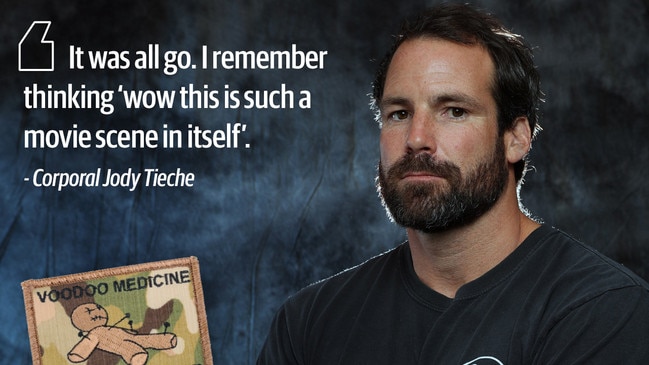
► WATCH PART TWO ABOVE
Commando Private Chad Elliott was lead scout and about 50m in front of the special forces foot patrol near Khas Oruzgan when at least 20 Taliban fighters opened fire with AK47s and rocket-propelled grenades.
One of the first shots fired sent a high velocity projectile from a 7.62mm round smashing into the top of Elliott’s right leg. That same moment, a grenade also exploded at his feet, spraying hot metal shrapnel into his left arm and abdomen.
“Getting shot was basically like getting hit with a sledgehammer,” Elliott said.
“Then a hot searing pain afterwards.”
MORE VOODOO MEDICINE
Cracking a joke helps medics save soldiers’ lives
Voodoo Medics — How they got their name
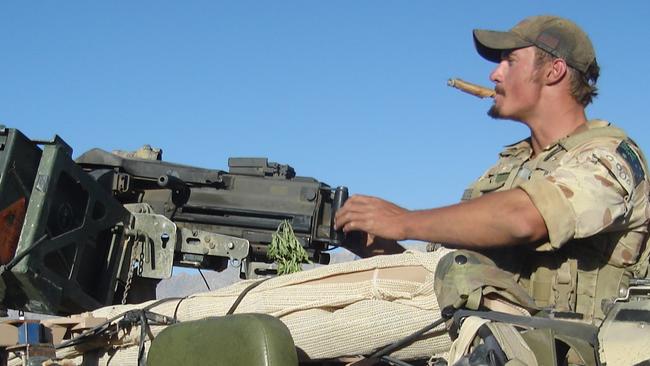
For both Tieche and Elliott, it was a life-changing moment that encapsulates the role of Voodoo Medics — the little-known band of elite specialist soldiers who patch up the best of Australia’s fighting forces when the worst happens on the battlefield.
The 30-man platoon, from the former 4th Battalion Royal Australian Regiment, was weeks into a vehicle-based patrol through Uruzgan province when they picked up enemy activity on a ridge line.
It was August 2007 and the fourth rotation for Australia’s Special Operations Task Group.
It was also summer — the traditional fighting season — and the 50C days were “like having a hair dryer to your face”.
The platoon from 4RAR Cdo’s Alpha Company was out on the dasht, flanked by mountains, when a burst of radio chatter indicated about 20 Taliban fighters in fortified positions in the cliff face were preparing to attack.
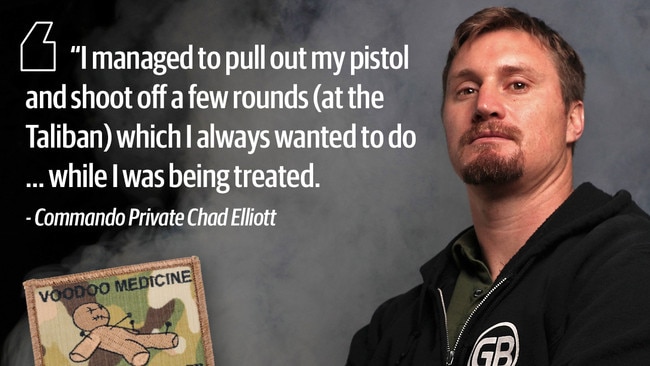
The Australian commandos were dangerously exposed on the valley floor, with little cover.
“Our platoon decided to do a dismounted patrol up to this ridge to do a bit of a recon,” Tieche said.
The team was creeping up the mountainside when “a hail of bullets and rocket fire” hit them.
As lead scout, Elliott copped the brunt of the ambush.
“I didn’t really know where it came from,” Elliott recalled from his home north of Sydney.
“I just saw a cloud of dust come up around and bullets striking the ground.
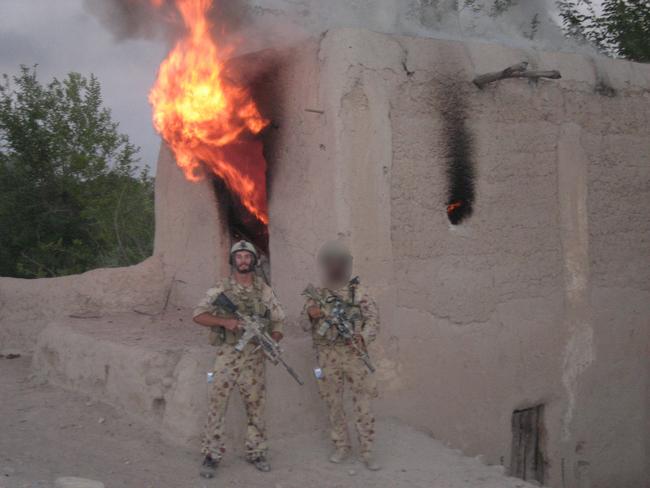
“From there I knew my leg was broken. It just crumpled underneath me.”
The bullet entry wound was the size of a fingernail but the round ripped a fist-sized hole through the then 25-year-old’s backside.
The battle-hardened soldier, who was on his second deployment to Afghanistan, rapidly lost blood and went into shock.
Mates sprinted forward and dragged him behind a rock as the Australians continued to exchange fire at the enemy above them.
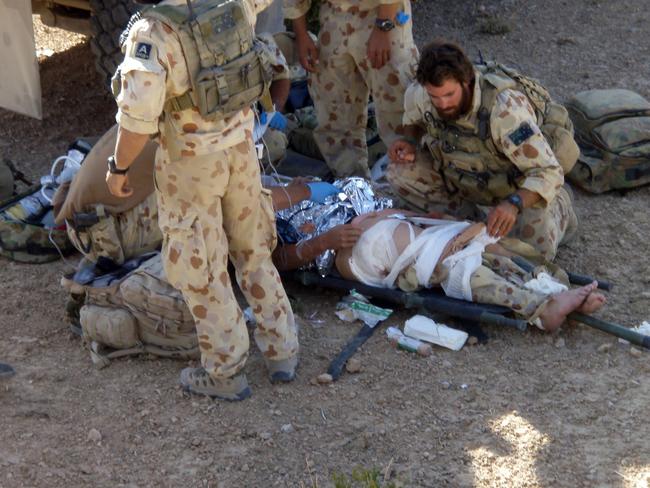
“They were shielding my body from gunfire,” Elliott said.
A commando combat first aider provided the initial treatment and the call went out to send forward a Bushmaster armoured vehicle carrying the unit’s medic — code named “Kilo”.
“I heard it over the comms that we had a prior 1 casualty … and we were off,” said Tieche.
“As soon as I peeled around the back of vehicle we had some small arms fire.
“It was all go. I remember thinking ‘wow this is such a movie scene in itself’.”
The platoon was remote, isolated and relying on the medical equipment they had carried.
Tieche used a shot off antenna from of the damaged vehicles as a splint between Elliott’s legs.
“We continued doing a full pat down, checking for other injuries. A bit of dark humour sort of kicked in,” Tieche said.
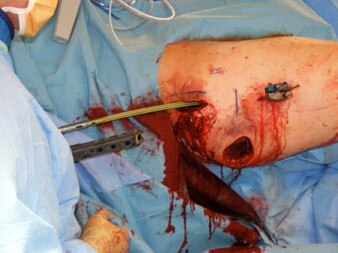
“He was in a condition where he was tolerating pain. We could talk to him. He was cohesive and alert. So in the good ol’ Aussie way we were delivering a little bit of dark humour.
“It was more along the lines of how close the gunshot wound was to his tackle and how lucky he was that he had small genitalia.”
“It was pretty funny at the time given the circumstances and how much tension was in that situation. Most of us were 23 or 24 year olds so it definitely lightened the pressure for a lot of us.”
It also spurred the patient, despite his horrific trauma, to fulfil one last mission.
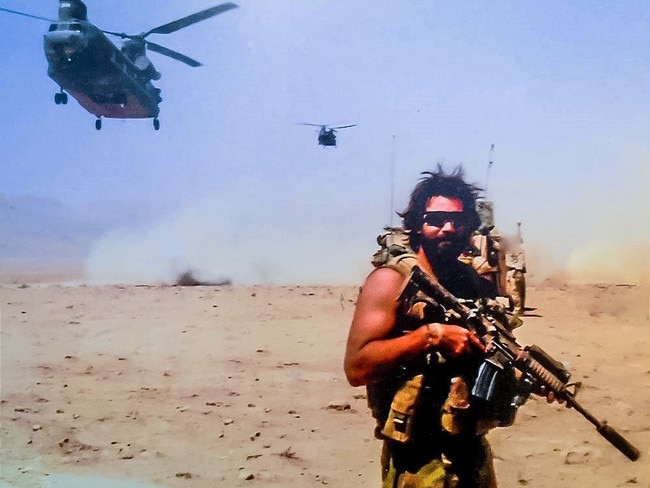
“I managed to pull out my pistol and shoot off a few rounds (at the Taliban) which I always wanted to do … while I was being treated,” he said.
It would turn out to be the last time Elliott fired his gun in combat.
He was extracted to a “safe zone” where Tieche gave him intravenous fluids, checked his morphine and monitored his vitals while they waited for the aeromedical evacuation chopper.
Tieche had saved his life.
“Jody was very confident and relaxed — just your typical surfie, nothing would really worry him,” said Elliott.
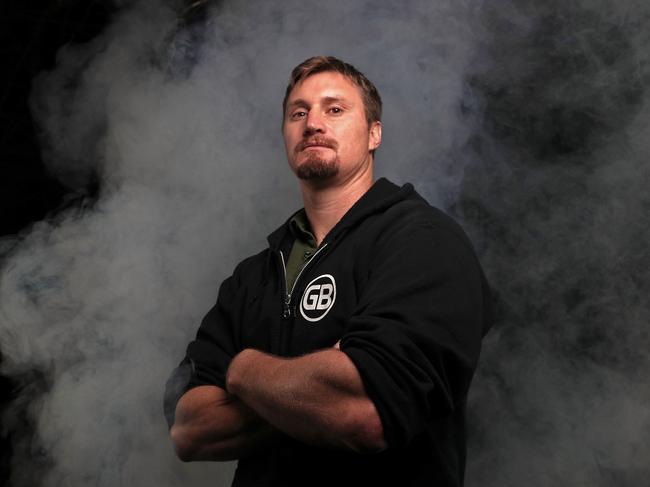
“He wouldn’t stress out or anything. He’s perfect for that role as a medic.
“Jody’s treatment of me was perfect. If it wasn’t good I’d be dead right now.”
A currently serving Kilo said that Tieche’s actions that day were worthy of a gallantry award.
An American Blackhawk evacuated Elliott after two other coalition partners refused to retrieve him from a ‘hot LZ’ — a landing zone with troops in contact.
It took him to the forward surgical theatre at Tarin Kowt where American surgeons stabilised him before transferring him to Kandahar for further treatment including the removal of shrapnel from his flesh.
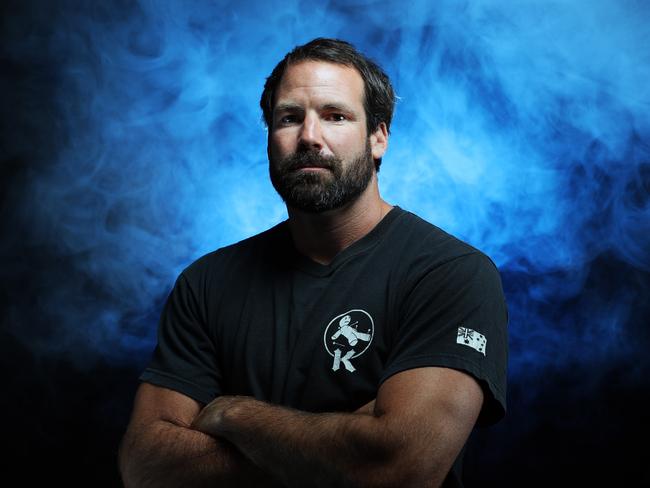
An American C130 flew him to Germany for definitive surgery where a titanium rod was inserted to hold his hip and femur together.
After that, he was brought back to North Shore Private Hospital in Sydney and a naval hospital, before commencing intensive rehab.
It was six weeks before he walked again and six months before he redeployed.
“I was pretty keen to get back there. I’d done all of my rehab, my training and I’d been passed to deploy,” he said.
“It wasn’t until I got over there that it really hit me.
“My body wasn’t quite up for it yet … but also mentally getting back out there was very hard.”
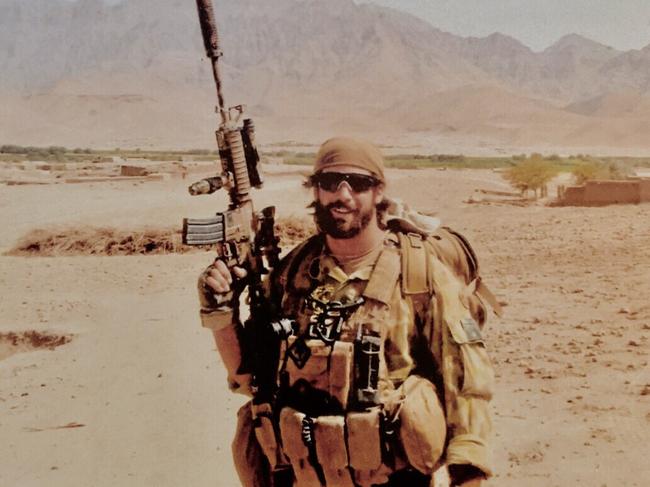
Back in Afghanistan, Elliott was about to pass through the gate at Tarin Kowt for his platoon’s first “gig” of the deployment, when he realised he “couldn’t do it”.
“It was extremely hard to leave the guys … it’s pretty much another family so to see them go out and go my separate way was very hard for me,” he said.
“That was the hardest decision of my life.”
Despite his trauma and resulting loss, Elliott says he’d “do it again”.
“I don’t think I’d change what happened,” he said.
“That event was a life-changing event, character building, something that I’ll never forget.
“I think it’s changed me for the better.”
Having trained and deployed together, Elliott and Tieche were already firm friends, sharing a love of surfing and ‘screamo’ bands before forging a lifelong bond in the dirt that day 11 years ago.
“It definitely it brought us closer. He’s the person who saved my life,” Elliott said.
“It’s a pretty special thing. Not many people would have that.
“Although we don’t travel and see each other we’ll always be friends.
“That will stay forever.”
